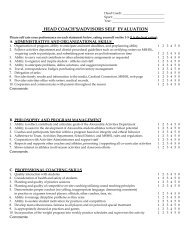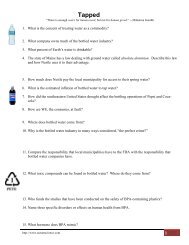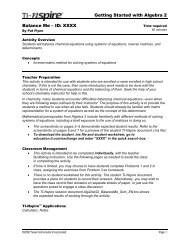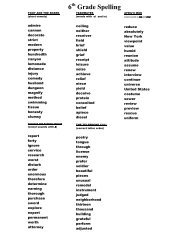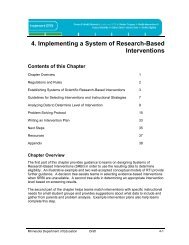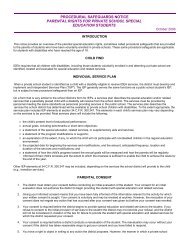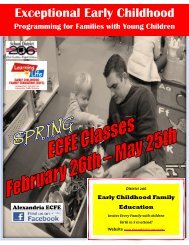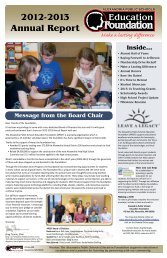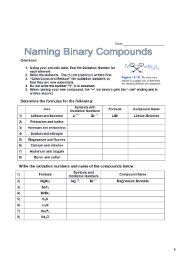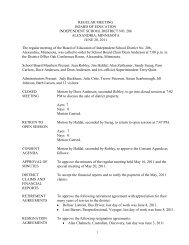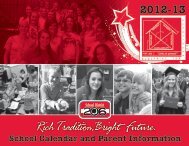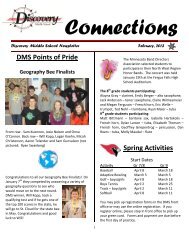Misdiagnosis and Dual Diagnosis of Gifted Children - Alexandria ...
Misdiagnosis and Dual Diagnosis of Gifted Children - Alexandria ...
Misdiagnosis and Dual Diagnosis of Gifted Children - Alexandria ...
You also want an ePaper? Increase the reach of your titles
YUMPU automatically turns print PDFs into web optimized ePapers that Google loves.
<strong>Misdiagnosis</strong> <strong>and</strong> <strong>Dual</strong> <strong>Diagnosis</strong> <strong>of</strong> <strong>Gifted</strong> <strong>Children</strong><br />
by James T. Webb, Ph.D., ABPP-Cl<br />
Many gifted <strong>and</strong> talented children (<strong>and</strong> adults) are being misdiagnosed by psychologists <strong>and</strong> other health<br />
care pr<strong>of</strong>essionals because specific social <strong>and</strong> emotional characteristics <strong>of</strong> gifted children are mistakenly<br />
assumed to be signs <strong>of</strong> pathology. Other children are gifted, but also have a coexisting disorder-a dual<br />
diagnosis-yet seldom is their giftedness considered in educational planning or treatment.<br />
Despite myths to the contrary, gifted children <strong>and</strong> adults are at some psychological risk. Certain internal<br />
<strong>and</strong> situational factors can lead to interpersonal <strong>and</strong> psychological behaviors that subsequently result in<br />
misdiagnoses <strong>and</strong> inadequate treatment.<br />
Internal Factors<br />
Historically, research on gifted individuals focused on the intellectual <strong>and</strong> academic aspects. Only<br />
recently is there focus on personality factors that accompany high intellect <strong>and</strong> creativity, with even less<br />
attention given to the observation that these personality factors intensify <strong>and</strong> have greater life effects<br />
when intelligence level increases beyond IQ 130 (Silverman, 1993; Webb, 1993; Winner, 2000).<br />
The most universal, yet most overlooked, characteristic <strong>of</strong> gifted children <strong>and</strong> adults is their intensity<br />
(Silverman, 1993; Webb, 1993). One mother described it succinctly when she said, “My child's life motto<br />
is that anything worth doing is worth doing to excess.” <strong>Gifted</strong> children-<strong>and</strong> gifted adults-<strong>of</strong>ten are<br />
extremely intense, whether in their emotional response, intellectual pursuits, sibling rivalry, or power<br />
struggles with authority figures. Impatience is also frequently present, both with oneself <strong>and</strong> with others.<br />
The intensity also <strong>of</strong>ten manifests itself in heightened motor activity <strong>and</strong> physical restlessness.<br />
Along with intensity, gifted individuals <strong>of</strong>ten show extreme sensitivity-to emotions, sounds, touch, taste,<br />
etc. These children may burst into tears while watching sad events on the evening news, keenly hear<br />
fluorescent lights, react strongly to smells, insist on having the tags removed from their shirts, or are<br />
overly reactive to touch in a tactile-defensive manner.<br />
The gifted individual's inherent drive to underst<strong>and</strong>, to question, <strong>and</strong> to search for consistency is likewise<br />
intense, as is the ability to see possibilities <strong>and</strong> alternatives. These characteristics, with the resulting<br />
idealism for social <strong>and</strong> moral issues, can result in anxiety <strong>and</strong> depression.<br />
Situational Factors<br />
Situational factors exacerbate the problem <strong>of</strong> misdiagnoses (Webb, 1993). Intensity, sensitivity, idealism,<br />
impatience, questioning the status quo-none <strong>of</strong> these necessarily constitutes a problem. In fact, we<br />
generally value these characteristics <strong>and</strong> behaviors-unless they occur in a tightly structured classroom. But<br />
gifted children commonly spend one-fourth to one-half <strong>of</strong> the regular classroom time waiting for others to<br />
catch up, <strong>and</strong> boredom is rampant. Peer relations for gifted children are <strong>of</strong>ten difficult because they are<br />
not with their intellectual peers (Webb, Meckstroth & Tolan, 1982; Winner, 2000).<br />
Lack <strong>of</strong> underst<strong>and</strong>ing by parents, educators, <strong>and</strong> health pr<strong>of</strong>essionals, combined with the problem<br />
situations (e.g., lack <strong>of</strong> appropriately differentiated education) leads to interpersonal problems that are<br />
mislabeled <strong>and</strong> prompt misdiagnoses.<br />
Common Misdiagnoses<br />
ADHD. The gifted child's characteristics <strong>of</strong> intensity, sensitivity, impatience, <strong>and</strong> high motor activity can<br />
easily be mistaken for ADHD (Webb & Latimer, 1993). Few health care pr<strong>of</strong>essionals note the<br />
admonition about ADHD in DSM-IV (2000) that says “...inconsistent with developmental level....” The
gifted child's developmental level is different when compared to other children, <strong>and</strong> health care<br />
pr<strong>of</strong>essionals should consider whether the child's inattentiveness or impulsivity occurs only in some<br />
situations but not in others. <strong>Gifted</strong> children seldom have problems with focused attention or impulsivity in<br />
areas they are interested in.<br />
Oppositional Defiant Disorder. The intensity, sensitivity, <strong>and</strong> idealism <strong>of</strong> gifted children <strong>of</strong>ten lead others<br />
to view them as “strong-willed.” Power struggles with parents <strong>and</strong> teachers are common, particularly<br />
when these children receive criticism, as they <strong>of</strong>ten do, for some <strong>of</strong> the very characteristics that make<br />
them gifted (e.g., “Why are you so sensitive, always questioning me, doing things differently,” etc.).<br />
Asperger's Disorder. Some gifted children, particularly if they are educationally misplaced, are very alo<strong>of</strong>,<br />
concerned with mechanical workings, precision <strong>and</strong> orderliness, <strong>and</strong> sometimes they are quirky. They<br />
may be mistakenly diagnosed as having Asperger's Disorder. However, their “symptoms” rapidly<br />
diminish or disappear when they are with intellectual peers who share their passionate interests, <strong>and</strong> they<br />
readily engage in interactions with others with reciprocity <strong>and</strong> sharing-patterns that are not seen in<br />
children with Asperger's Disorder.<br />
Bipolar <strong>and</strong> other Mood Disorders. <strong>Gifted</strong> children may react with extreme mood swings in the face <strong>of</strong><br />
events, such as a bitter divorce, <strong>and</strong> some have received the diagnosis <strong>of</strong> Bipolar Disorder. In adolescence,<br />
or sometimes earlier, gifted children <strong>of</strong>ten experience periods <strong>of</strong> depression related to their disappointed<br />
idealism, <strong>and</strong> their feelings <strong>of</strong> aloneness <strong>and</strong> alienation culminate in an existential depression.<br />
Obsessive-Compulsive Disorder. Even as preschoolers, gifted children organize people <strong>and</strong> things into<br />
complex frameworks, <strong>and</strong> are seen as perfectionistic <strong>and</strong> “bossy.” They continue to search intensely for<br />
consistency in the “rules <strong>of</strong> life.” Their intellectualizing, sense <strong>of</strong> urgency, perfectionism, idealism, <strong>and</strong><br />
intolerance for mistakes may be misunderstood to be signs <strong>of</strong> Obsessive-Compulsive Disorder. In some<br />
sense, however, giftedness is a dual diagnosis with Obsessive-Compulsive Personality Disorder since<br />
intellectualization underlies many <strong>of</strong> the DSM-IV diagnostic criteria for this disorder.<br />
<strong>Dual</strong> Diagnoses<br />
Learning Disabilities <strong>and</strong> <strong>Gifted</strong>ness. <strong>Gifted</strong>ness can be a coexisting factor in diagnosis <strong>and</strong> treatment <strong>of</strong><br />
learning disabilities. Few psychologists are aware that as a child's overall IQ score exceeds 130, the<br />
scatter <strong>and</strong> span <strong>of</strong> abilities increases (Silverman, 1993; Webb & Kleine, 1993; Winner, 2000). Such<br />
scatter suggests an unusual learning style <strong>and</strong> perhaps a learning disability. Sometimes, the two conditions<br />
obscure each other; the child is neither recognized as learning disabled or as gifted. And even if there is a<br />
recognition <strong>of</strong> both conditions, most <strong>of</strong>ten only one or the other is served by the child's school.<br />
Poor h<strong>and</strong>writing is <strong>of</strong>ten used as one indicator <strong>of</strong> learning disabilities. However, many gifted children<br />
show poor h<strong>and</strong>writing. Usually this simply represents that their thoughts go faster than their h<strong>and</strong>s, <strong>and</strong><br />
that they see little sense in making writing an art form when its primary purpose is to communicate<br />
(Webb & Kleine, 1993; Winner, 2000).<br />
Without intervention, self-esteem issues are almost certain in gifted children with learning disabilities, as<br />
well as those who simply have notable asynchronous development; these children tend to evaluate<br />
themselves based more on what they cannot do rather than on what they are able to do.<br />
Sleep Disorders <strong>and</strong> <strong>Gifted</strong>ness. A little known observation is that about twenty percent <strong>of</strong> gifted children<br />
seem to need significantly less sleep than other children, while another twenty percent appear to need<br />
significantly more sleep than other children. These sleep patterns show themselves early in the child's life,<br />
<strong>and</strong> long-term follow up suggests that the pattern continues into adulthood (Webb & Kleine, 1993;<br />
Winner, 2000). Parents also commonly report their gifted children have dreams that are more vivid,<br />
intense, <strong>and</strong> in color, <strong>and</strong> that gifted boys are more prone to sleepwalking <strong>and</strong> bed-wetting.<br />
Reactive Hypoglycemia <strong>and</strong> <strong>Gifted</strong>ness. Though there is little formal study <strong>of</strong> giftedness <strong>and</strong><br />
hypoglycemia, anecdotal evidence suggests that the two are related. These are children-usual slender-who<br />
function quite well in school until mid-morning. Then they have a meltdown ; they are highly emotional,<br />
distractible, irritable, impulsive, <strong>and</strong> have difficulty concentrating. Then, about 30 minutes after lunch,<br />
they once again function well <strong>and</strong> pleasantly until about mid-afternoon, at which time another meltdown
occurs. The intensity appears to be consuming glucose to such a degree that they simply run out <strong>of</strong> fuel,<br />
<strong>and</strong> need to have healthy snacks that are high in protein <strong>and</strong> have moderate carbohydrates (Webb, Amend,<br />
Webb, Goerss, Beljan, & Olenchak, 2005).<br />
Relational Problems <strong>and</strong> <strong>Gifted</strong>ness. As one mother said, “Having a gifted child in the family did not<br />
change our family's lifestyle; it destroyed it!” Parents <strong>of</strong>ten lack information about characteristics <strong>of</strong> these<br />
exhilarating <strong>and</strong> exhausting children, <strong>and</strong> the relationship between parent <strong>and</strong> child can suffer. They see<br />
the child's behaviors as mischievous, impertinent, weird, or strong-willed, <strong>and</strong> the child <strong>of</strong>ten is punished<br />
for behaviors that really represent curiosity, intensity, sensitivity, or the lag <strong>of</strong> judgment behind intellect.<br />
Intense power struggles, arguments, temper tantrums, sibling rivalry, withdrawal, underachievement, <strong>and</strong><br />
open flaunting <strong>of</strong> family <strong>and</strong> societal traditions may occur. Diagnoses <strong>of</strong> Parent-Child Relational<br />
Problems or Sibling Relational Problems may result.<br />
Conclusion<br />
Many <strong>of</strong> our brightest, most creative young minds not only go unrecognized, but also are <strong>of</strong>ten incorrectly<br />
diagnosed. SENG (Supporting Emotional Needs <strong>of</strong> <strong>Gifted</strong>) is undertaking several programs to increase<br />
awareness among parents, educators, <strong>and</strong> health-care pr<strong>of</strong>essionals. More information is available at<br />
www.sengifted.org or in the award-winning book, <strong>Misdiagnosis</strong> <strong>and</strong> <strong>Dual</strong> Diagnoses <strong>of</strong> <strong>Gifted</strong> <strong>Children</strong><br />
<strong>and</strong> Adults (Webb, et al, 2005).<br />
References<br />
Diagnostic <strong>and</strong> statistical manual <strong>of</strong> mental disorders (4th ed., text revision. (2000). Washington, DC:<br />
American Psychiatric Association.<br />
Silverman, L. K. (1993). Counseling the gifted <strong>and</strong> talented. Denver: Love Publishing.<br />
Webb, J. T., & Latimer, D. (1993). ADHD <strong>and</strong> children who are gifted. Reston, VA: Council for<br />
Exceptional <strong>Children</strong>. ERIC Digests #E522, EDO-EC-93-5.<br />
Webb, J. T. (1993). Nurturing Social-Emotional Development <strong>of</strong> <strong>Gifted</strong> <strong>Children</strong>. Chapter in K. A.<br />
Heller, F. J. Monks, & A. H. Passow (Eds.), International h<strong>and</strong>book <strong>of</strong> research <strong>and</strong> development <strong>of</strong><br />
giftedness <strong>and</strong> talent (pp. 525-538). Oxford: Pergamon Press.<br />
Webb, J.T., Amend, E.R., Webb, N.E., Goerss, J., Beljan, P., & Olenchak, F.R. <strong>Misdiagnosis</strong> <strong>and</strong> dual<br />
diagnoses <strong>of</strong> gifted children <strong>and</strong> adults: ADHD, Bipolar, Asperger's, Depression, <strong>and</strong> Other Disorders.<br />
Scottsdale, AZ: Great Potential Press.<br />
Webb, J. T. & Kleine, P. A. (1993). Assessing gifted <strong>and</strong> talented children. Chapter in J. L. Culbertson, &<br />
D. J. Willis (Eds.), Testing young children (pp. 383-407). Austin, TX: Pro-ed.<br />
Webb, J. T., Meckstroth, E. A., & Tolan, S. S. (1982). Guiding the gifted child: A practical source for<br />
parents <strong>and</strong> teachers. Scottsdale, AZ: Great Potential Press.<br />
Winner, E. (2000). The origins <strong>and</strong> ends <strong>of</strong> giftedness. American Psychologist (55, No. 1), 159-169.<br />
(James T. Webb, Ph.D., has been recognized as one <strong>of</strong> the 25 most influential psychologists nationally on<br />
gifted education. A licensed psychologist, Dr. Webb established SENG (Supporting Emotional Needs <strong>of</strong><br />
<strong>Gifted</strong> <strong>Children</strong>, Inc.), a national nonpr<strong>of</strong>it organization that provides information, training, conferences<br />
<strong>and</strong> workshops. He is the author <strong>of</strong> five books, three <strong>of</strong> which have won awards: Guiding the <strong>Gifted</strong><br />
Child: A Practical Source for Parents <strong>and</strong> Teachers; Gr<strong>and</strong>parents' Guide to <strong>Gifted</strong> <strong>Children</strong>; <strong>and</strong><br />
<strong>Misdiagnosis</strong> <strong>and</strong> <strong>Dual</strong> Diagnoses <strong>of</strong> <strong>Gifted</strong> <strong>Children</strong> <strong>and</strong> Adults: ADHD, Bipolar, OCD, Asperger's,<br />
Depression, <strong>and</strong> Other Disorders.)<br />
(This article was published in the September/October, 2006, issue <strong>of</strong> Outlook, the newsletter <strong>of</strong> the<br />
Minnesota Council for the <strong>Gifted</strong> <strong>and</strong> Talented (MCGT). Dr. Webb will be the keynote speaker for<br />
MCGT’s annual conference on Saturday, Oct. 21, at the University <strong>of</strong> St. Thomas in St. Paul. More<br />
information <strong>and</strong> registration materials are on the website www.mcgt.net)



